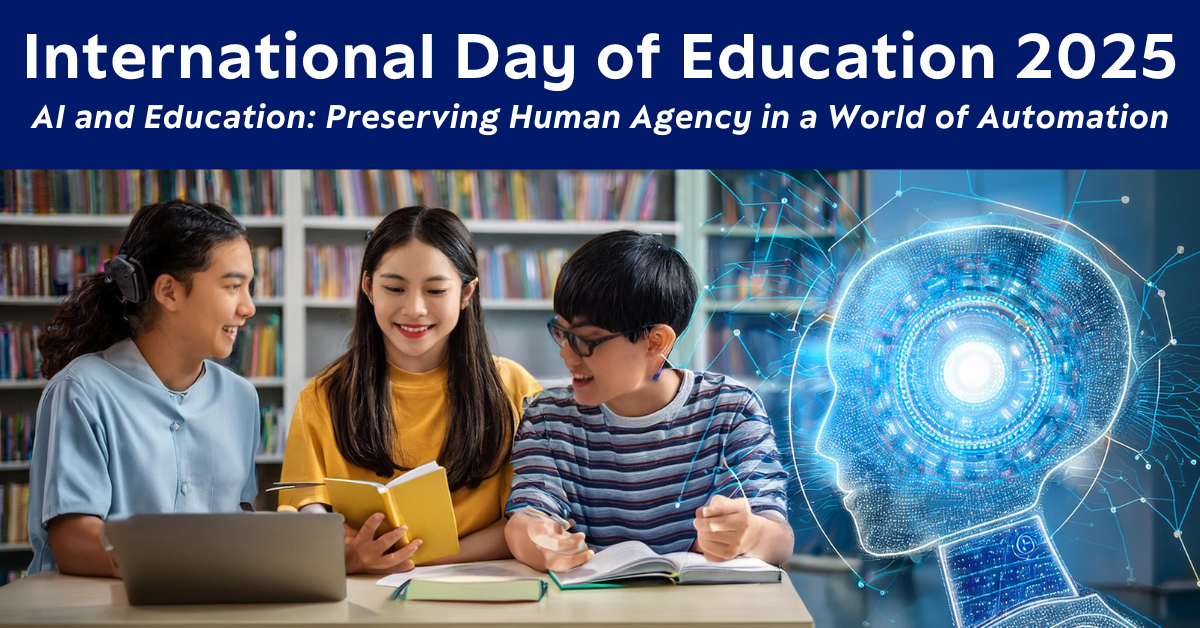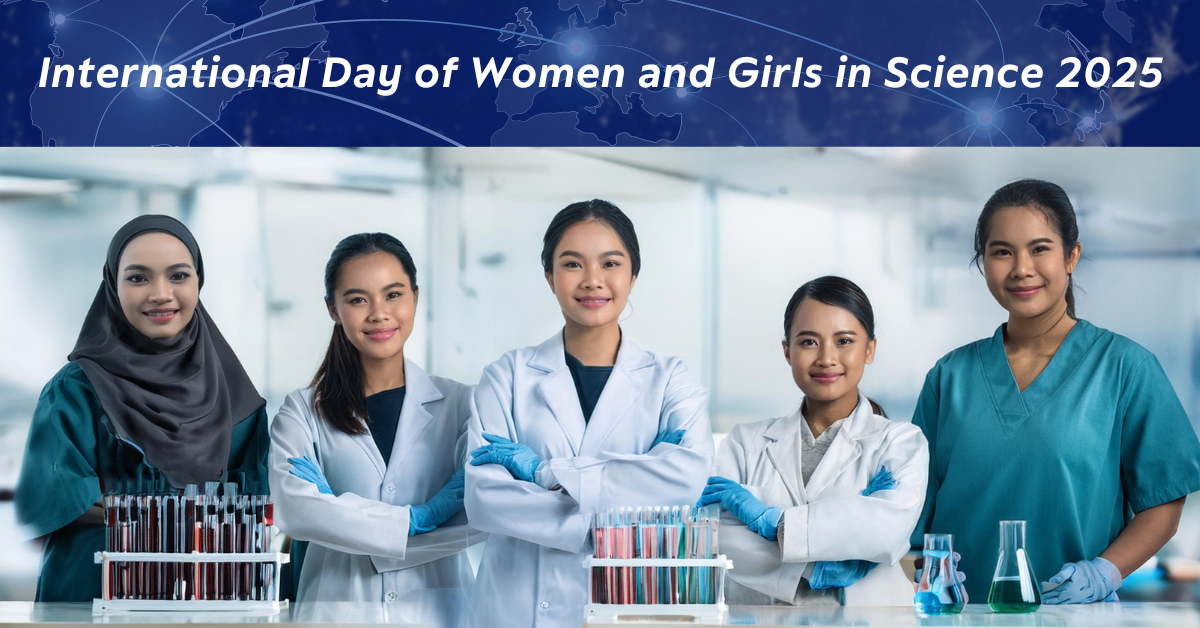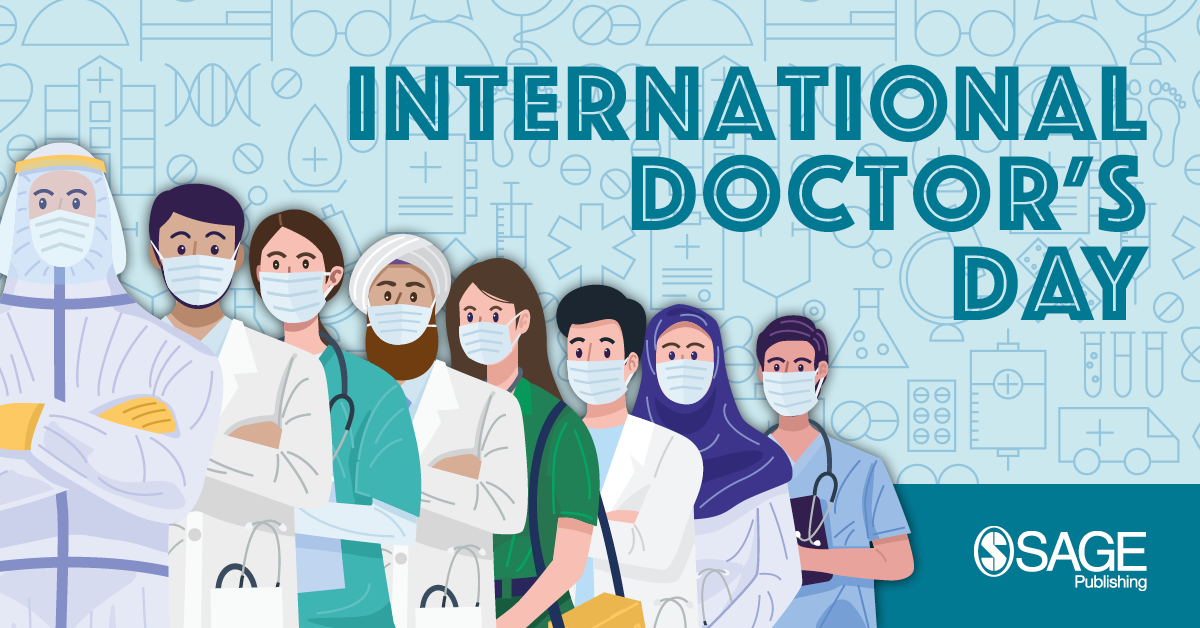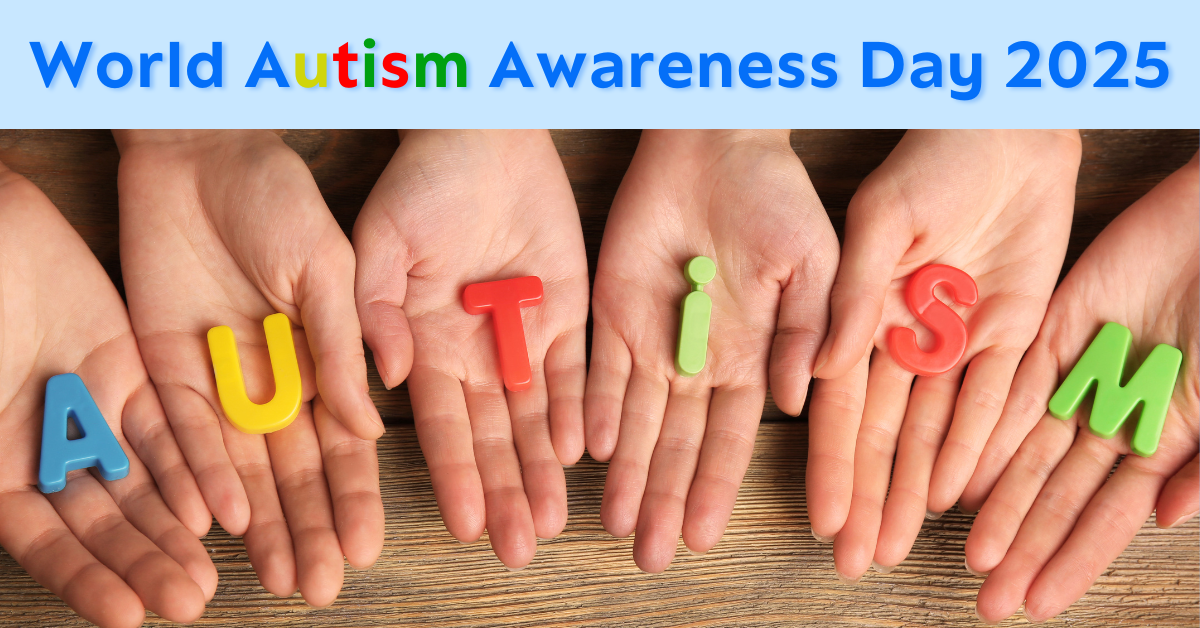
As Artificial Intelligence (AI) continues to transform the world, superintelligent AI systems have started to play pivotal roles in our lives. Baker et al. (2023) point to the emergence of Man3, a “new computational superintelligence” that presents both exciting opportunities and significant challenges. The authors outlined possible futures for AI in education and raised critical questions prompting us to consider what opportunities and challenges AI in Education might bring on the International Day of Education 2025.
International Day of Education 2025
Observed on 24 January 2025, the International Day of Education highlights education as a fundamental human right. It emphasizes inclusive and equitable quality education, while promoting lifelong learning as a means to end poverty and achieve gender equality. With 244 million children out of school and 763 million adults illiterate, this day calls for action to transform education and to achieve Sustainable Development Goal 4. Themed “AI and Education: Preserving Human Agency in a World of Automation” this year, we look at AI’s impact on education and its implication on humanity.
Role of Education 4.0
Education has long been shaped by evolving concepts of intelligence and influenced by historical, cultural, and technological shifts. AI in Education marks a phase where smart technology, artificial intelligence and robotics redefine how we learn and assess. In their bibliometric study, Sharma et al. (2023) explored Education 4.0 in the context of the Fourth Industrial Revolution and identified five main themes.
Education 4.0 emphasizes the importance of creating a Blueprint with clear framework and strategies that help in Preparing for Future Challenges. Equipping learners and educators with future-ready skills is crucial, especially when the World Economic Forum’s The Future of Jobs Report 2025 identifies skills gap as the biggest barrier to future jobs.
The research also highlights themes like Environmental Learning and Sustainable Development, Leadership Development, and Promoting Innovation and Creativity in preparing learners and preserving human agency in the face of the evolving digital landscape. (Sharma et al., 2023)
AI in Education
“Artificial Intelligence (AI) has the potential to address some of the biggest challenges in education today, innovate teaching and learning practices, and ultimately accelerate the progress toward SDG 4” - UNESCO
AI is a disruptive force that brings both exciting and challenging transformations to education and society. In their study, "Competing Visions of Artificial Intelligence in Education: A Critical Analysis of Policy Documents," Linderoth, Hultén, and Stenliden (2023) discuss how societal perspectives shape the perceived opportunities and challenges of AI in education.
In academia alone, university professors are grappling with the increased use of ChatGPT in assignments. While some prohibit its use, others are “seizing the moment, recognizing in the emergence of ChatGPT an opportunity to dig deep into higher education’s purpose of combining inquiry and scholarship with preparation for an ever-changing world”. Those in support of AI leverage it in various ways, such as using it to refine students’ awareness and even developing “AI tutoring tools to help guide students to figure out the right answers, rather than spoon-feeding answers.” (Belkin, 2023)
Opportunities of AI in Education
With intentional use, AI can support education in various ways. One of the most significant opportunities is to provide personalized learning experiences. Leveraging AI, educators can tailor learning programs to match individual needs (Linderoth et al., 2024). They can also develop and utilise powerful aids such as Khan Academy’s Khanmigo and WolframAlpha’s ChatGPT plugin, that act as virtual tutors to simplify complex solutions.
AI’s adaptive capabilities allow educators to identify strengths and areas for improvement in real-time, and companies like Duolingo are tapping into this to enhance engagement and improve learning.
Besides catering to different learning styles and paces, AI can provide assistive tools to enhance learning for students with disabilities (Linderoth et al., 2024). For instance, speech-to-text applications, AI-powered translators, and other customized interfaces. All these make quality education accessible, opening doors of opportunities to anyone, anywhere in the world.
To better prepare the next generation for the labour market and for economic growth, developing AI-related skills is essential. AI tools and concepts in education can lay the foundation for understanding and collaborating with AI while equipping them with the skills needed to meet the demands of future jobs.(Linderoth et al., 2024).
Challenges of AI in Education
Despite the benefits, adopting AI in education presents several challenges. First and foremost, we must acknowledge that not everyone has access to the basic requirements - electricity, internet, and a computing device - which are essential for AI to work. That, in itself, presents a challenge.
In order for AI to adapt and personalise programs, it necessitates the collection and utilization of student data. The data can range from performance details to location and even personal information such as age and gender. Here, ethics and privacy are crucial; stringent safeguarding is required to guard against abuse and misuse of information. Furthermore, there is the issue of algorithmic bias, where AI systems trained on biased data may exacerbate inequalities. (Linderoth et al., 2024) (Baker et al., 2023).
It is said that the automation capabilities of AI can streamline administrative tasks such as grading, scheduling, and even setting questions, reducing workload on educators. However, it is also found that “digitalization is often a source of longer working hours, role expansion, increased non-teaching, and administrative duties.” In addition to adapting their pedagogy to the algorithms, educators have to constantly educate and update themselves on technological changes (Linderoth et al., 2024).
One of the more concerning aspects of AI in education is that it may reduce human interaction. Students' overall growth is aided by the interpersonal relationships that exist between teachers and students, which cultivate critical thinking, empathy, and vital social and communication skills. While AI can enhance aspects of education, it cannot completely replace human interaction (Linderoth et al., 2024).
Preserving Human Agency in AI in Education
AI in education offers unprecedented opportunities to enhance learning. Yet it also challenges us to rethink traditional constructs and human interaction in education. In September 2024, UNESCO introduced AI competency frameworks which emphasize ethical, human-centered engagement with technology. Grounded in human-centered values, these frameworks ensure AI supports rather than replaces human functions and decision-making. Let’s make the future of education not just about AI and automation but about humanity.
Which aspect of AI in education do you find most exciting? What do you find concerning? Share your thoughts in the comments below.
References:
UNESCO. (n.d.). International Day of Education. https://www.unesco.org/en/days/education
UNESCO. (2025, January 24). International Day of Education 2025 global event in New York: Artificial intelligence and education: Challenges and opportunities. https://www.unesco.org/en/articles/international-day-education-2025-global-event-new-york-artificial-intelligence-and-education
Belkin, D. (2023, May 16). Inside universities' love-hate relationship with ChatGPT. The Wall Street Journal. https://www.wsj.com/articles/inside-universities-love-hate-relationship-with-chatgpt-92808293





